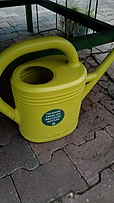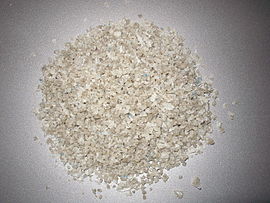- Sorting plastic waste at a single-stream recycling centre
- Baled colour-sorted used bottles
- Recovered HDPE ready for recycling
- A watering can made from recycled bottles
Plastic recycling is the processing of plastic waste into other products.[1][2][3] Recycling can reduce dependence on landfill, conserve resources and protect the environment from plastic pollution and greenhouse gas emissions.[4][5] Recycling rates lag behind those of other recoverable materials, such as aluminium, glass and paper. From the start of plastic production through to 2015, the world produced around 6.3 billion tonnes of plastic waste, only 9% of which has been recycled and only ~1% has been recycled more than once.[6] Of the remaining waste, 12% was incinerated and 79% was either sent to landfills or lost to the environment as pollution.[6]
Almost all plastic is non-biodegradable and without recycling, spreads across the environment[7][8] where it causes plastic pollution. For example, as of 2015, approximately 8 million tonnes of waste plastic enters the oceans annually, damaging oceanic ecosystems and forming ocean garbage patches.[9]
Almost all recycling is mechanical and involves the melting and reforming of plastic into other items. This can cause polymer degradation at the molecular level, and requires that waste be sorted by colour and polymer type before processing, which is often complicated and expensive. Errors can lead to material with inconsistent properties, rendering it unappealing to industry.[10] Though filtration in mechanical recycling reduces microplastic release, even the most efficient filtration systems cannot prevent the release of microplastics into wastewater.[11][12]
In feedstock recycling, waste plastic is converted into its starting chemicals, which can then become fresh plastic. This involves higher energy and capital costs. Alternatively, plastic can be burned in place of fossil fuels in energy recovery facilities, or biochemically converted into other useful chemicals for industry.[13] In some countries, burning is the dominant form of plastic waste disposal, particularly where landfill diversion policies are in place.
Plastic recycling is low in the waste hierarchy, meaning that reduction and reuse are more favourable and long-term solutions for sustainability.
It has been advocated since the early 1970s,[14] but due to economic and technical challenges, did not impact the management of plastic waste to any significant extent until the late 1980s. The plastics industry has been criticised for lobbying for expansion of recycling programmes, even while research showed that most plastic could not be economically recycled.[15][16][17][18] This has resulted in occasions where plastic waste dropped into recycling bins has not been recycled, and been treated as general waste.[19]
- ^ Al-Salem, S.M.; Lettieri, P.; Baeyens, J. (October 2009). "Recycling and recovery routes of plastic solid waste (PSW): A review". Waste Management. 29 (10): 2625–2643. Bibcode:2009WaMan..29.2625A. doi:10.1016/j.wasman.2009.06.004. PMID 19577459.
- ^ Ignatyev, I.A.; Thielemans, W.; Beke, B. Vander (2014). "Recycling of Polymers: A Review". ChemSusChem. 7 (6): 1579–1593. Bibcode:2014ChSCh...7.1579I. doi:10.1002/cssc.201300898. PMID 24811748.
- ^ Cite error: The named reference
cycleswas invoked but never defined (see the help page). - ^ Hopewell, Jefferson; Dvorak, Robert; Kosior, Edward (27 July 2009). "Plastics recycling: challenges and opportunities". Philosophical Transactions of the Royal Society B: Biological Sciences. 364 (1526): 2115–2126. doi:10.1098/rstb.2008.0311. PMC 2873020. PMID 19528059.
- ^ Lange, Jean-Paul (12 November 2021). "Managing Plastic Waste─Sorting, Recycling, Disposal, and Product Redesign". ACS Sustainable Chemistry & Engineering. 9 (47): 15722–15738. doi:10.1021/acssuschemeng.1c05013.
- ^ a b Cite error: The named reference
Geyer2017was invoked but never defined (see the help page). - ^ Andrady, Anthony L. (February 1994). "Assessment of Environmental Biodegradation of Synthetic Polymers". Journal of Macromolecular Science, Part C: Polymer Reviews. 34 (1): 25–76. doi:10.1080/15321799408009632.
- ^ Ahmed, Temoor; Shahid, Muhammad; Azeem, Farrukh; Rasul, Ijaz; Shah, Asad Ali; Noman, Muhammad; Hameed, Amir; Manzoor, Natasha; Manzoor, Irfan; Muhammad, Sher (March 2018). "Biodegradation of plastics: current scenario and future prospects for environmental safety". Environmental Science and Pollution Research. 25 (8): 7287–7298. Bibcode:2018ESPR...25.7287A. doi:10.1007/s11356-018-1234-9. PMID 29332271. S2CID 3962436.
- ^ Jambeck, Jenna; et al. (13 February 2015). "Plastic waste inputs from land into the ocean". Science. 347 (6223): 768–771. Bibcode:2015Sci...347..768J. doi:10.1126/science.1260352. PMID 25678662. S2CID 206562155.
{{cite journal}}: CS1 maint: date and year (link) - ^ Cite error: The named reference
EU-demandwas invoked but never defined (see the help page). - ^ Paul, Andrew (8 May 2023). "Recycling plants spew a staggering amount of microplastics". Popular Science. Retrieved 8 May 2023.
- ^ Brown, Erina; MacDonald, Anna; Allen, Steve; Allen, Deonie (1 May 2023). "The potential for a plastic recycling facility to release microplastic pollution and possible filtration remediation effectiveness". Journal of Hazardous Materials Advances. 10: 100309. Bibcode:2023JHzMA..1000309B. doi:10.1016/j.hazadv.2023.100309. ISSN 2772-4166. S2CID 258457895.
- ^ Zhang, Fan; Zhao, Yuting; Wang, Dandan; Yan, Mengqin; Zhang, Jing; Zhang, Pengyan; Ding, Tonggui; Chen, Lei; Chen, Chao (1 February 2021). "Current technologies for plastic waste treatment: A review". Journal of Cleaner Production. 282: 124523. doi:10.1016/j.jclepro.2020.124523. ISSN 0959-6526.
- ^ Cite error: The named reference
The Plastics Issuewas invoked but never defined (see the help page). - ^ National Public Radio, 12 September 2020 "How Big Oil Misled The Public Into Believing Plastic Would Be Recycled"
- ^ CBC (8 October 2020) [Sep 23, 2020]. "Recycling was a lie — a big lie — to sell more plastic, industry experts say". CBC Documentaries.
- ^ PBS, Frontline, 31 March 2020, "Plastics Industry Insiders Reveal the Truth About Recycling"
- ^ Dharna Noor (15 February 2024). "'They lied': plastics producers deceived public about recycling, report reveals". theguardian.com. Retrieved 16 February 2024.
- ^ McCormick, Erin; Simmonds, Charlotte; Glenza, Jessica; Gammon, Katharine (21 June 2019). "Americans' plastic recycling is dumped in landfills, investigation shows". The Guardian. ISSN 0261-3077. Retrieved 6 July 2024.



